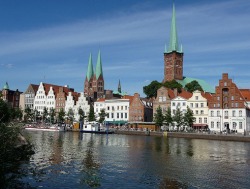Urban History in Northern Europe Intersession Programme

Programme Information Pamphlet (PDF)
Students enrolled in MUN’s Department of History's off-campus intersession programme for 2017 will visit northern Germany, Sweden and Finland to study the history of urbanisation from the Viking age through the twentieth century. This programme begins in St. John's with lectures and discussions before launching upon an exciting experience in some of Europe's finest but frequently overlooked towns and cities.
An Information Session will be held on Tuesday 27 September at 12:00 in A-1045.
Dates: 8-24 May in St. John's, 26 May - 18 June in Europe
Participants in the programme will visit several museums and historic towns and cities, as well as attend special lectures by European scholars, archivists and urban planners. The German section will focus on the legacy of the German Hanse, a late medieval association of merchant cities in the North and Baltic Sea areas. Highlights will include experiencing medieval Lübeck, the birthplace of the German Hanse and home of the new European Hanse Museum; visiting Bremen and its renowned market place and town hall; and reliving Haithabu, an early urban centre of the Viking age. In Sweden, participants will visit Malmö, a recipient of several awards for its sustainable development; the university town of Lund with its celebrated cathedral; the important port city of Gothenburg; the 17th-century fortress of Carlsten; and Stockholm with its Old Town dating from the 13th century. The overnight ferry from Stockholm takes participants to Helsinki and the 18th-century fortress of Suomenlinna – one of five UNESCO World Heritage Sites included in this programme.
Timetable
8-26 May: St. John's
27-28 May: Bremen
29 May: Bremerhaven
30 May: Bremen
31 May - 1 June: Schleswig / Haithabu
2 - 4 June: Lübeck with option to visit Berlin or Hamburg (not included in the programme fee)
5 June: Wismar, Stralsund, Greifswald
6 June: Lübeck
7 June: Ferry from Travemünde – Trelleborg
8 June: Malmö
9 June: Malmö and Lund
10 June: Malmö with option to visit Copenhagen or Ystad (not included in the programme fee)
11 June: Gothenburg
12 June: Marstrand and Carlsten fortress
13 - 15 June: Stockholm
16 - 17 June: Helsinki
18 June: return to St. John's
Courses
This programme consists of two courses:
HIST 2340 – European Urban History
This survey course studies the process of urbanisation from the early modern period through the twentieth century. To some people, these urban environments represent progress and modernity by combining administrative prowess, economic dominance and social and cultural advances and opportunity. Others envision these places as the epitome of human decadence characterised by filth, poverty, drunkenness and sexual immorality. Among the topics discussed are the locations and functions of these centres, the evolution and rationalisation of urban space, contradictory perceptions of the city and city life, the social and demographic consequences of urban life on individuals and families, and the recent responses to urbanisation in the 20th century.
HIST 3940 – Urban Life in Medieval Europe
This course will study the impact of late medieval and early modern urbanisation on a variety of phenomena ranging from participative government, social and cultural diversity, secular literacy, and solutions to environmental challenges. The origins, social fabric, art and culture of the Hanseatic cities are given particular attention. Topics covered will include travelling merchants and prostitutes, opportunities for women as businessowners, beer consumption in cities short on drinking water, the management of human waste, and the politics of urban governments having enough confidence to launch wars against kings. Participants will reflect on how this impacted the unique culture of Hanseatic cities in a world connecting Iceland with Asia, while discovering the context that saw the emergence of the sites that will be seen during the trip to Europe.
There are no prerequisites for the programme and it is open to all students.
Costs
Tuition: CAD 510 (Canadian Students), CAD 1760 (International Students)
Accommodation and Transportation: CAD 1800 (shared accommodation) including breakfasts except on ferry. (Some of this may be tax-deductible).
Programme Fee: Includes all field trip expenses e.g. admission to museums, travel according to programme itinerary, and Pub Tour. Total = CAD 400. (This is tax deductible).
Travel to / from Europe:
The flight from St. John's to Hamburg and return from Helsinki to St. John's will cost approximately an additional CAD 1,100.
* Please note that the above costs for accommodation and the programme fee is subject to change slightly despite our best efforts to provide as accurate information as possible.
Important Deadlines
- Tuition and Programme Fees as per MUN regulations
- Initial deposit of CAD 250 to be paid by 25 November, 2016.
- Second deposit of CAD 250 to be paid by 7 January, 2017.
- Balance to be paid by 3 April, 2017.
Contact
For further information contact:
Dr. Stephan Curtis
Department of History
A-4009
Email: stephanc@mun.ca
Dr. Sébastien Rossignol
Department of History
A- 4003
Email: srossignol@mun.ca